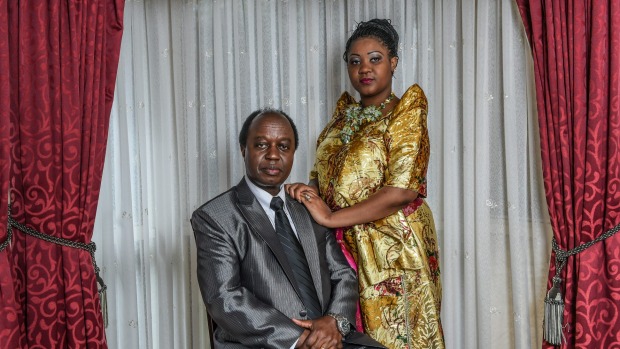
Aggrey Kiyingi, chairman of the Uganda Federal Democratic Organisation, with his wife Mayimuna Nakayiira in their Sydney home. Photo: Brendan Esposito
- Kampala: Daniel Byansi, 21, is a Ugandan student who has only ever known one president, and is desperately yearning for change. He’s hoping “the doctor” will deliver this to his country.
“The infrastructure is in bad condition, let my future children have some good roads,” said Mr Byansi. “Let them experience good health services.”

A student puts up campaign material for Ugandan opposition presidential candidate Aggrey Kiyingi in Kampala. Photo: Amy Fallon
“The doctor” is Ugandan Aggrey Kiyingi, now a Castle Hill-based cardiologist, who moved to Australia in 1982, and has a practice in Merrylands in Sydney.
To the authorities, he is a wanted man, after being charged in absentia in March with terrorism, murder, attempted murder and crimes against humanity over the recent killings of Muslim clerics.

Aggrey Kiyingi is going up against Ugandan President Yoweri Museveni, who has been in power since 1986. Photo: Amy Fallon
But Dr Kiyingi, who is alleged to have provided logistical and financial support to Muslim rebel group Allied Democratic Forces (ADF), linked to the murders by Ugandan police, vehemently denies the charges. He claims they’re part of the game plan of Yoweri Museveni, 70, who has ruled Uganda since 1986, ahead of the country’s 2016 elections.
“If there was no support for me in Uganda, Museveni would not be having sleepless nights,” said Dr Kiyingi, who has declared he will challenge the veteran leader as president.
“If there was no support for me, police would not be harassing my supporters, arresting, following them, threatening them.

Campaign material for Ugandan opposition presidential candidate Aggrey Kiyingi. Photo: Amy Fallon
“By the very fact that they’re spending so much time and money trying to block anybody who says the name ‘Kiyingi’, in the papers or on the radio, that tells you a lot of things”.
In Uganda, opposition leaders and activists are regularly arrested. Supporters of sacked prime minister and former Museveni ally, Amama Mbabazi, who officially declared his presidential ambitions earlier this week, have already been jailed for unlawful assembly and early electioneering.
It’s now also “like a crime” to be found with Kiyingi’s leaflets, said supporters of his Uganda Federal Democratic Organisation (UFDO) party.

Aggrey Kiyingi, chairman of the Uganda Federal Democratic Organisation. Photo: Brendan Esposito
UFDO is yet to be officially registered in Uganda, but for the past two years about 160 followers have been campaigning for their “liberator”. Since December, 20,000 posters, 55,000 fliers, and 1.5 million business cards have been handed out.
But the party claimed in the last year about 87 supporters have been arrested for unlawful assembly, many charged and jailed. Daniel said he was detained for about six hours after police discovered Kiyingi’s photo on his phone. Frank Bulira, 33, who gave up his teaching job to volunteer as a UFDO youth mobiliser, alleged that he was tortured after handing out the cards at a university.
“My eyes were sprayed with tear gas so I couldn’t see,” he said. “I was beaten. Then they took me to their so-called safe houses, the police plus other special force agents.” Mr Bulira was charged, released from jail a week later and the case was dismissed – but only after more intimidation and threats.
“They told me that ‘we are in control, you don’t know the regime you’re playing with … next time we find you doing this work you’re going to meet your creator’,” said Mr Bulira.
The UFDO campaign is now being carried out in Uganda carefully “door-to-door”, online, by supporters such as Daniel, and via radio from other countries including the US, South Africa and Australia, where Dr Kiyingi said he had “tremendous” backing.
“Some people have said ‘we’ll go on the plane with you to protect you’,” said Dr Kiyingi, adding he would “definitely” return to Uganda by the end of the year. “They know Museveni’s a dictator, he’s a killer.”
Dr Kiyingi said he had not been served with any Ugandan court summons in Australia, and that the Ugandan High Commission in Canberra had not contacted him about the charges.
Uganda police spokesperson Fred Enanga said the authorities had been monitoring Dr Kiyingi, in 2006 acquitted of organising his wife’s killing, for the past two years.
“It is prudent that he gets back home,” said Mr Enanga.
But he said Uganda would soon apply to have Kiyingi extradited under a Commonwealth arrangement.
The only people linked to Dr Kiyingi who had been arrested, said Mr Enanga, were “the ones undergoing training for recruitment into rebel activities”.
Lawyer Ladislaus Rwakafuuzi, representing some of the 23 indicted alongside Dr Kiyingi, including his sister-in-law, described the charges as trumped-up. He said it was the current regime’s plan to leave them “languishing” in prison until after the election, due early next year.
“Then they can say they’re no longer interested in the case,” said Mr Rwakafuuzi, adding “Museveni never leaves anything to chance”.
In Australia, Dr Kiyingi is continuing to work “96 hours a day, or what it feels like”.
“Museveni’s fooled the world for so long and he thinks he can get away with it,” he said.
“This time he’s playing with the wrong man. I’m not going to give up.”
When he does return to Uganda, Dr Kiyingi’s supporters will be waiting.
“We shall move with him everywhere, because he is what it will take to liberate the country,” said Mr Bulira.
The Ugandan government was approached for comment but did not respond.
